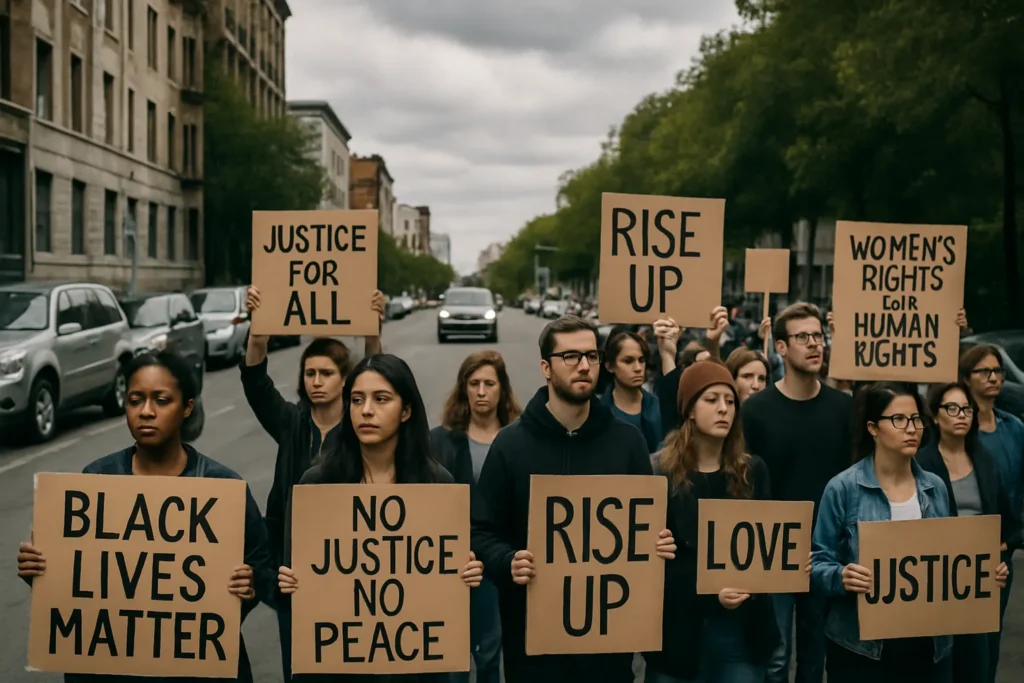Shadows of Violence: When Democracy Meets the Road
On a sunlit Saturday in Culpeper, Virginia, what should have been a peaceful exercise in free speech was abruptly transformed into a moment of fear and chaos. As demonstrators dispersed from the ‘No Kings’ protest—a rally meant to decry authoritarian tendencies and celebrate pluralism—a 21-year-old man, Joseph R. Checklick Jr., allegedly drove his SUV into the crowd. No serious injuries were reported. Still, the incident left a deep bruise: it reminded Virginians and the nation just how precarious the line is between civic engagement and personal jeopardy in America’s fractious political climate.
The ‘No Kings’ rally, organized by local Democrats and advocacy groups, drew a vibrant turnout: more than 600 participants gathered across two major locations, their placards raised in defiance of rising authoritarian rhetoric and militarized displays in Washington. For many, the occasion held special meaning. It coincided with President Trump’s 79th birthday and Flag Day, on the same weekend the Army staged its ‘Grand Military Parade and Celebration’ in D.C.—an ostentatious display of power that critics saw as out of step with the nation’s tradition of civilian rule.
The emotional resonance was palpable. Children perched on parents’ shoulders chanted slogans, elderly veterans handed out American flags, and the crowd reportedly included faith leaders, teachers, and frontline health workers. These were not fringe agitators but concerned citizens, united by a belief in the values inscribed in the Constitution. Yet for all their hope, the shadow of violence was inescapable. According to Culpeper Police, Checklick remains in custody without bond, and further charges may loom as the investigation unfolds. Law enforcement is urging anyone with video, photos, or testimonies to reach out, emphasizing that protecting protest rights must go hand-in-hand with public safety.
Historic Parallels: From Charlottesville to Culpeper
The image of a vehicle accelerating into a crowd of demonstrators stirs harrowing memories for Virginians. Just seven years ago, only 60 miles from Culpeper, the world watched in horror as James Alex Fields Jr. weaponized his car during the infamous “Unite the Right” rally in Charlottesville, killing Heather Heyer and wounding dozens. While the Culpeper incident ended with no reported injuries, the specter of Charlottesville lingers, warning of the real dangers that can arise from leaving unchecked political animosity to fester.
What pushes a young man to target peaceful protesters? While motivations remain officially unclear, the timing and tenor of the ‘No Kings’ events matter. Across the U.S., these coordinated rallies opposed not just the administration’s military display, but the broader drift toward strongman politics. This is no abstraction for attendees—a recent Pew Research study found that 61% of Americans fear a “significant decline in democratic norms” in the past decade, coinciding with spikes in protest violence tied to political divisions.
That violence is not confined to Virginia. Bozeman, Montana witnessed its own flashpoint the same day: a protester was allegedly threatened by a man wielding a hammer. Texas authorities evacuated their state capitol after threats toward lawmakers, while Minnesota canceled planned rallies following the shooting of two state officials. Each headline feels like another warning light blinking on the fragile dashboard of American democracy.
“We cannot accept a society where peaceful protest puts our lives at risk—not now, not ever. Standing up to power must not be a death-defying act.”
This isn’t just political rhetoric—it’s lived reality. University of Virginia political scientist Larry Sabato noted, “After Charlottesville, there was a nationwide reckoning with whether our society can protect dissent. Every incident since tests that resolve.”
Democracy at the Crossroads: Who Will Stand Up For Protest Rights?
Some might say, “There were no serious injuries—what’s the big deal?” But that’s a dangerous normalization of intimidation and implied violence. Beyond that, the attempt alone chills democracy. Harvard Law Professor Carol Steiker writes that when protestors fear for their safety, public dissent gives way to silent acquiescence, corroding the very mechanisms that hold leaders accountable.
Unfortunately, conservative responses too often minimize these threats, framing such incidents as isolated or justified by supposed provocations. Yet the facts don’t bear this out. In recent years, several Republican-led states have pushed bills expanding legal immunity for drivers who harm protesters blocking streets. The message is chilling and unmistakable: dissent may carry a death sentence. It’s a betrayal of the First Amendment, and it echoes through every attempt to legislate protest out of existence, from anti-BLM crackdowns to the criminalization of climate marches.
The implications stretch far beyond Culpeper. Every protest marred by violence sends ripples through communities, especially among those on the margins—people who remember past government crackdowns or carry scars from earlier eras of repression. A closer look reveals that these moments test whether America is still a nation where collective action builds, rather than breaks, the public square.
Progressives cannot afford to be complacent in defending the rights of assembly. The call is for more than just words—a renewed commitment to safeguarding protest spaces, holding perpetrators accountable, and building bridges across political divides where possible. Police reforms must include training on de-escalation and crowd protection. Lawmakers must block attempts to undermine protest rights. Ordinary citizens can support with witness testimonies, video evidence, and solidarity statements, refusing to let fear silence dissent.
The story of the Culpeper “No Kings” protest is not just about what happened on a Saturday in Virginia. It’s about what kind of country America strives to be—one where those who speak up aren’t run down by those who disagree. Where ‘No Kings’ is more than a slogan; it’s a rallying cry for democracy itself.

